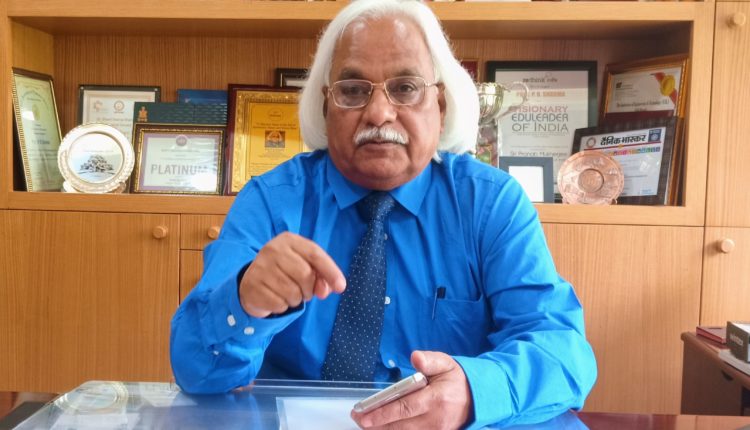3-language formula should be established on mother tongue Hindi: Prof (Dr) Pritam B Sharma
The government should have discussed the policy threadbare before withdrawing draft recommendations following intense backlash from Tamil Nadu, as well as protests from some other States.
New Delhi. Indian government’s volte-face on introducing mandatory Hindi language in all schools in the draft of National Education Policy early this month has irked the educationists and scholars fraternity of the country.
Perturbed over the withdrawal of draft recommendations following intense backlash from Tamil Nadu, as well as protests from some other States, the academic community has suggested that the government should have discussed the policy threadbare before taking any decision on this. It could have taken recourse of the latest Census that suggests Hindi as a maximum spoken language in the country.
They have said that 3-language formula should be established on mother tongue Hindi and one foreign language which at the moment was English. As regards the languages of Asian countries like Korea and Japan with which India is strongly allying, they said India must not fail in its policies and programs to nurture and further strengthen this age-old affinity within Asia, especially with the orient countries like Korea and Japan.
According to the eminent educationist Prof (Dr) Pritam B Sharma, Vice Chancellor, Amity University Haryana (AUH), Gurgaon, the government should look at the latest Census, and see how many people in India speak and understand Hindi, and that is the majority.
“Therefore, we have to develop one language that connects the whole of the nation in terms of understanding each other, and that is Hindi in any case. They could have discussed the education policy threadbare, and realized that to create India of our dream where India is one emotionally, culturally as well as socially it would be essential to have to one common language for the whole of the nation,” said Prof. Sharma. He is also the Founder Vice Chancellor of DTU and RGTU and Immediate Past President of the Association of Indian Universities (AIU).
It is suggested that to promote this concept; the government could have very well said that the 3-language formula should be built on mother tongue, Hindi and one foreign language which at the moment is English.
“We are learning English not because we want to communicate within India, but it is because it is spoken globally. This formula is working in Karnataka already, in Andhra Pradesh and other southern states but why it cannot be in Tamilnadu. In return, the Hindi speaking states too would also adopt the 3- language formula where Hindi, one southern language and English so that children here also know their language. By doing this you could have created a homogeneous India rather than India where you have to speak English to your friends to communicate,” said Prof. Sharma adding that language is an excellent communication, emotion and unless the nation converges to one language emotionally India cannot be one, and it will remain heterogeneous and divided on languages, caste color.
As regards the inclusion of Asian languages in the curriculum in the backdrop of increasing friendship and cooperation in all spheres between India and countries like Korea, Japan, and other East Asian countries, Prof. Sharm said India’s cultural affinity and spiritual connect strongly exist in South Korea, Japan, Singapore, Indonesia, Jawa, Sumatra, Taiwan and in China, Thailand, and India must not fail in its policies and programs to nurture and further strengthen this age-old affinity within Asia, especially with the orient countries.
“Especially now that the center of gravity of the global economic growth is heavily leaning towards the east, this is the opportune time for India to play its paternal role to create One-Asia community that could facilitate the making of all Asian nations materially prosperous and spiritually enlightened such that the growth and development draws the poorest of the poor in the mainstream of the nation’s development in each constituent country. Let the motto be: Each generation should shoulder the responsibility to hand over a better world to the next generation compared to what they have inherited,” said Prof Sharma.”
While cautioning that the language that is spoken and communicated in any country played a vital role in deciding the character of that country as, he said, the language had had a direct connection with culture and peace of the region.
“In this respect, India has to understand that the language that you speak and communicate with, plays an important role in your own emotional and psychological development. There is, in fact, a direct nexus between language, culture, and peace. As such, India’s classical roots in Sanskrit and its derivative languages become an important pillar of strength to enrich respect for diversity, unity of purpose and peaceful co-existence,” said Prof Sharma suggesting that in addition to the study of English in the 3-language formula, schools and colleges, and universities should also promote study of one Asian language (Korea, Japanese, Chinese and Russian) so as to create a honing ground for a one-Asia Community of tomorrow.
While expressing his profound happiness, Prof. Sharma said that at Amity University Haryana (AUH), Gurgaon, the Asian languages like Korean, Chinese, Japanese and Russian are very popular amongst the students who take up the study of one of these languages during their degree programs.
“The Amity Schools of languages offers the study of these languages as one of the electives to all the students of the university. As such, the Amity promotes the study of one foreign language beyond English as a mendatory aspect of its degree program. It may be noted that recently, the AUH, has concluded the first phase of One-Asia community project sponsored by One-Asia Foundation of Japan. JNU is the only university in India that has been awarded such a program,” concluded Prof Sharma.


